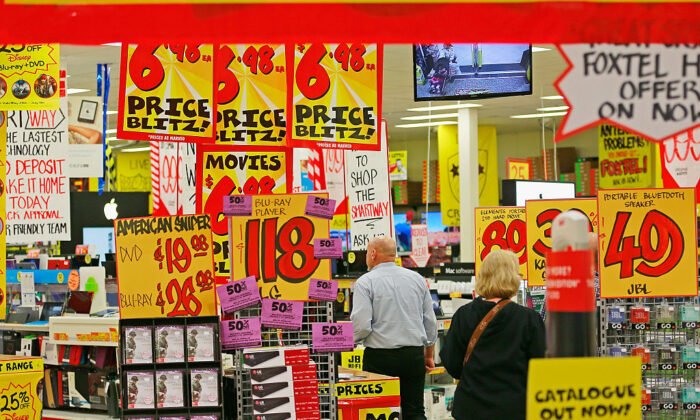Ombudsman Warns Small Businesses of Deteriorating Situation in Post-Pandemic Australia
‘If small and family businesses are the ’engine room of the economy‘, we have lost a cylinder in a four-cylinder engine in the aftermath of COVID,’ he said.
Australia’s small business sector—traditionally a major driver of the economy—is facing a decline in influence, with the country potentially “sleepwalking” towards an economy dominated by large corporations, the Ombudsman for the sector has warned.
Australian Small Business and Family Enterprise Ombudsman Bruce Billson points out that in 2006, small firms contributed 40 percent of the gross domestic product (GDP) and employed 53 percent of the private sector’s workforce.
Now, those figures have dropped to 33 percent of the GDP and 42 percent of the private labour force.
The situation is becoming dire, with 46 percent of small businesses failing to turn a profit in the latest available accounts.
Moreover, three-quarters of self-employed business owners, who rely entirely on their business for their livelihood, are earning less than the average full-time wage.
“This is a worrying trajectory,” Billson said. “We are sleepwalking into a ‘big corporate’ economy.”
“If you believe as I do, that small and family businesses are the ‘engine room of the economy’, we have lost a cylinder in a four-cylinder engine in the aftermath of COVID,” he said.
RBA Decides Against Lowering Interest Rates
Further compounding the issue, small businesses are struggling with inflation and high interest rates. The Reserve Bank of Australia’s recent decision not to lower rates for at least six months will put more strain on the sector.
Governor Michele Bullock is expected to address these post-pandemic conditions in an upcoming speech in Armidale.

To counter these challenges, Billson has advanced a range of measures aimed at supporting small businesses. Among these is a tax discount or offset scheme for new small businesses, which would allow them to re-invest more income during their critical early phases.
“We need more incentives for those starting a small business, a simple, quick and cost-effective way for small business owners to settle court disputes, and more emphasis on encouraging younger Australians to consider business ownership,” he explained.
Billson also emphasised the need for “right-sized regulation” that recognises the limited resources of small firms.
He suggests that mandating the lowest possible fees for tap-and-go transactions could save small businesses around $1 billion a year.
Additionally, more favourable government procurement policies could provide valuable support.
He advocates for the establishment of a dedicated Small Business Commissioner and Division within the Fair Work Commission to address the unique needs of smaller employers.
Furthermore, he proposes that every new government proposal that goes to Cabinet should include an analysis of how it would affect the small business sector.





